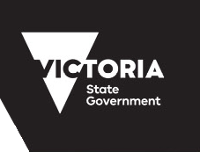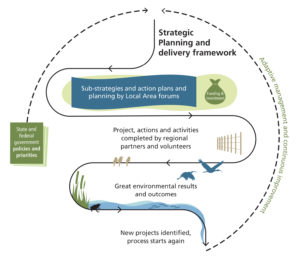The West Gippsland Regional Catchment Strategy (RCS) identifies the opportunities and priority management directions for Integrated Catchment Management for the six years from 2021 to 2027.
A collaborative approach to planning and delivery at the local and regional scales will help us to achieve our vision ‘Catchment Health, Gippsland’s Wealth’.
The RCS will be delivered through partnerships with Traditional Owners, government and non-government agencies, private land managers, environmental groups and the broader community. There is no dedicated or secure fund source for RCS implementation and its delivery will require RCS partners to secure funds to resource of projects and actions.
Implementation of the RCS
An overarching implementation plan will be developed following the approval of the RCS, it will:
- Identify and establish partnerships for collaborative delivery and shared measurement
- Describe the arrangements for local area forums
- Develop a timeline for implementation
- Establish the detailed monitoring, evaluation, reporting and improvement plan.
The multi-agency RCS Steering Committee will continue to provide leadership and oversight of the RCS during the implementation phase.
Local area forums will form the basis of implementing the RCS between 2021-2027. Local area forums will seek to enhance and build on existing arrangements. The membership of local area forums will be extended to RCS partners and other interested parties. Local area forums will consider the regional outcomes and priorities identified at a regional and local area scale when refining and prioritising actions and projects. Unfunded priorities will be identified, and project opportunities will be explored and developed as part of a prospectus for future investment.
Principles for local area forums
- Coordinate, collaborate and support partner organisations to implement key priority actions for land, water and biodiversity
- Develop flexible participation arrangements that respect the capacity and resourcing constraints of Traditional Owner groups, small organisations and community groups
- Share information to support organisations to achieve their outcomes
- Support monitoring of the implementation of key strategies and align with regional outcomes
- Work collaboratively to identify opportunities for funding and implementation of key priorities for land, water and biodiversity in the local area.
Strategic planning and delivery framework
The diagram to the right, illustrates the strategic planning and delivery framework that will be used for RCS implementation. It captures how the RCS links to and guides sub-strategies and action plans and planning b local area forums to deliver projects and activities. These projects result in great environmental outcomes as measured through the RCS outcomes and more detailed evaluation processes. Adaptive management and continuous improvement are processes that help to ensure partners respond to emerging issues and longer term changes such as population growth and climate change.




